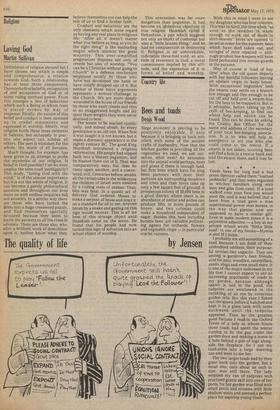Country life Bees and toads Denis Wood
Siege economy is proving to be positively enjoyable, if only because it is bringing us back into tolich with some of the ancient crafts of husbandry. Now that the kitchen garden is providing all the vegetables we need, we ask ourselves, what next? An extension into the animal world perhaps, hens and goats if there is enough land. but first bees which have for long been partners with man: their pastures are surrounding meadows and trees and their hives take up only a few square feet of ground. A prosperous colony of 50,000 bees in a good district where there is an abundance of nectar and pollen can produce fifty or more pounds of honey, and two colonies could make a household' independent of sugar. Besides this, bees including bumble bees, are valuable pollinating agents for orchards, flowers and vegetable crops — in particular scarlet runners.
Spectator May 17, 1975
With this in mind I went to see my daughter who has four colonies. This was in April, the time when "as soon as the weather is warm enough to work out of doors in shirt-sleeves" hives are opened to be set in order for the summer, bees which have died taken out, and ravages of mice repaired — although prudent bee-keepers will have fixed perforated zinc mouse-guards in the autumn.
May of course is 'load of hay time' when the old queen departs with her faithful followers leaving an upstart virgin to keep house. With exceptional beginners' luck the swarm may settle on a branch low enough and thin enough to be cut off and held over a swarm-box for the bees to be trapped in. But is it advisable, before taking up the craft of bee-keeping, to find out where help and advice can be found. This can be done by asking the County Bee Officer for the name and address of the secretary of your local bee-keeping association. It is he who will help in emergency or tell you who else could come to the rescue. If a swarm is not taken, scouting bees will find a hole in a tree or bank and lead the swarm there, and it may be lost.
Toads have for long had a bad press. Spencer called them "loathed paddocks" and they were regarded as witches' familiars along with bats and gibs (tom-cats). If a toad walked over your foot you would soon die, and it was belived that a bone from a toad gave a man supernatural power over horses, in the way that gipsies now are supposed to have a similar gift. Even in quite modern times it is a pejorative adjective — a boy at my private school wrote "filthy little toad" in one of my books—Hymns A and M I think.
I probably am still something of a toad because I am fond of their undoubted oddness, their purposeful savrian-like sagacity. They are among a gardener's best friends, avid for ants, woodlice, caterpillars, snails, slugs and even small mice. It is one of the major sadnesses in my life that I cannot expect to see an increasing population of toads in my garden, because although spawn is laid in the pond, the tadpoles are swallowed in the twinkling of an eye by voracious golden orfe. But this year I fished out the spawn before it hatched and kept it in a glass tank with some duckweek until the tadpoles appeared. Then by the greatest good fortune I read in the Oxford Times of a lady in whose house three toads had spent the winter coming in by the gap under the garden door and making a home in a hole behind a pile of logs alongside the fireplace. So I put my toad-poles into a large watering can and went to see her.
The two larger toads had by then gone back into the garden, but a small one, only about an inch in
size, was still there. The lady .emptied my can of tadpoles with practised gentle skill into one of her
pools, for her garden was filled with small pools and streams with little shallow weirs and seemed a perfect place for aspiring young toads.


























 Previous page
Previous page